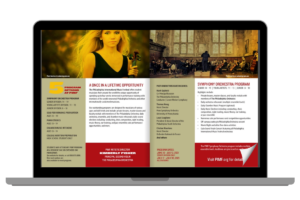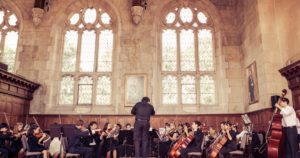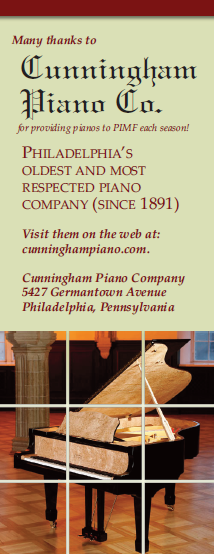
Gloria dePasquale / Cellist / The Philadelphia Orchestra
Gloria dePasquale joined The Philadelphia Orchestra’s cello section in 1977 at the invitation of Eugene Ormandy. Prior to that she served as associate principal cello of the Buffalo Philharmonic under Michael Tilson Thomas and was also a substitute player for the Boston Symphony and the Boston Pops Orchestra.
Born in Evansville, Indiana, Mrs. dePasquale credits the public school music program of her home town for her introduction to the cello. She graduated with honors with both her Bachelor of Music and Master of Music degrees from the New England Conservatory of Music in Boston where she was a student of Stephen Geber.
Mrs. dePasquale was cellist of the dePasquale String Quartet for more than two decades. The Quartet was in residence at Villanova University and presented a highly-acclaimed chamber music series, performing with such artists as Yo-Yo Ma, Emanuel Ax, Christoph Eschenbach, Yefim Bronfman, Wolfgang Sawallisch, and André Watts. Mrs. dePasquale was also cellist in the dePasquale Trio, performing alongside her late husband, William, and her daughter, Francesca.
Mr. and Mrs. dePasquale were frequent soloists with area community and youth orchestras, performing both the Brahms Double Concerto and Saint-Saëns’sThe Muse and the Poet. Their last public performance together as soloists was in June 2010 in Verizon Hall at the Kimmel Center in Philadelphia performing with the Philadelphia Youth Orchestra. Last season Mrs. dePasquale was again soloist with the Philadelphia Youth Orchestra, performing Haydn’s C-major Cello Concerto in Verizon Hall.
Mrs. dePasquale is an advocate for music education both at The Philadelphia Orchestra, where she chairs the musician Education Committee, and in the Philadelphia Youth Orchestra, where she is artistic advisor to the organization and artistic advisor and conductor of the PRYSM and PRYSM Young Artist orchestras, founded six years ago with her late husband.
Mrs. dePasquale maintains a large private studio and runs monthly master classes and performance classes for her students. Her graduating students regularly are accepted into the nation’s finest conservatories, colleges, and universities. She also teaches for the New York State School of Orchestral Studies in Saratoga Springs, New York, every August and also is on the faculty of the Luzerne (NY) Music Center and the Philadelphia International Music Festival.
We initiated a conversation with members of the Philadelphia Orchestra about their beginnings in music, their inspirations and aspirations. Please join us each week to see many of your new favorites featured right here!
What is your all-time, favorite movie? Gone with the Wind
What CD are you currently listening to? Philadelphia Orchestra’s Glorious Sound of Christmas
Is there a genre of music, other than classical, that makes your spirit soar? Frank Sinatra
Other than music, what inspires you most? Visual art and reading philosophical writings, especially poetry.
Who else in your family is musical? My daughter Francesca is a masters student violinist at Juilliard studying with Itzhak Perlman and is his teaching assistant.
Who first introduced you to your instrument? What do you remember about the experience? Public school music. I remember the smell of the violin polish and the texture of the chin rest. First cello the next year because I was “tall.”
What is your all-time favorite piece (to play, to listen to, etc.)? Squire Tarantella
What is it that you like most about this piece? The tarantella rhythm and the contrasting lyrical middle section.
What is your perfect family dinner night? When all my children and two granddaughters are present and equal conversation of the legal profession and music.
Do you always have music on your mind? No
What element or experience from your childhood still drives you today in your professional life? All City Orchestra experience and my experience in the professional orchestra of the Evansville, IN Orchestra with great students from IU.
If you were in a classroom of 5 year-olds and they asked “Who your favorite cartoon character is,” who would it be and why? Dennis the Menace because he reminds me (still) of my oldest son.
What do you most enjoy teaching? I enjoy teaching proper form and technique and scales. These elements enable a musician to become free to express without so many limitations!
What changes would you implement at a grade school level to instill a greater interest in music studies? Availability to all instruments and choir for everyone. Bring in professional ensembles on a regular basis so that children know what is possible.
What is your favorite thing to do when not performing? Read, partake in book discussion groups, visit art museums and installations.
What is your favorite piece to hear SOMEONE ELSE perform? Bach solo suites for cello
When did you first know that you wanted to be a professional musician? I first realized that it was possible to be a professional cellist when I was in high school but didn’t decide to go for it until I was a senior in high school.
Who is your favorite musical icon, living or dead? Itzhak Perlman
Do you still get nervous before a performance, and if so – how do you cope? Yes; of course. Anyone who says no is lying or kidding himself! Preparation is the only insurance to a good performance.
What is your general practice routine? Scales, intervals, Sevcik, Cossmann, Popper for an hour or more before working on whatever else is on my music stand.
What aspect of making music excites you the most right now ? Communicating with the audience an authentic interpretation.
What is the most unusual musical gig in which you have ever participated? Filming the prelude to Bach Suite #1 on the Philadelphia Art Museum steps with three other Philly Orchestra Cellists for an IMAX introduction to Philly Film that was shown for years at the Franklin Institute.
If you could be anything else in the world, what would it be? An attorney.
Any closing thoughts for your followers, fans, and admirers? There is nothing technical on the cello that can’t be mastered with slow methodical and sequential practice over time.



